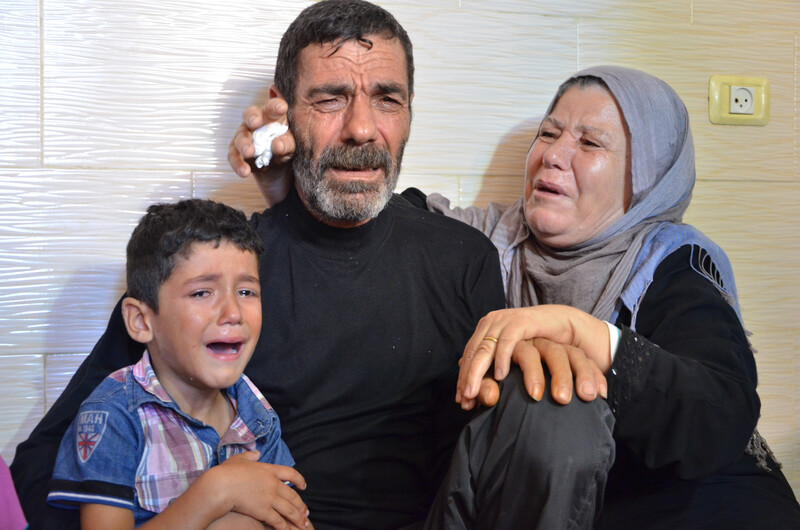The Electronic Intifada Gaza Strip 19 July 2014

Muhammad Baker is comforted by his sister in Gaza’s Beach Camp.
The day before he was killed, “Ismail came home carrying fresh fish and began joking with his brothers and sisters. He seemed unusually cheerful and happy,” his mother Sahar Baker told The Electronic Intifada at her home in Gaza’s Beach Camp just twenty-four hours after her son’s brutal slaying.
“I asked him, my son, why did you go to the beach while the situation is dangerous? He answered, we were playing as we wanted to play, why should we be afraid?” Sahar said.
Ismail Muhammad Baker, nine years old, was killed along with his cousins Ahed Atif Baker and Zakaria Ahed Baker, both ten years old, and eleven-year-old Muhammad Ramiz Baker when Israeli fire targeted them on a beach near Gaza City’s seaport on 16 July.
The massacre, witnessed by international journalists at the nearby Al-Deira hotel, caused outrage around the world and drew attention to the horrifying death toll among Gaza’s children.
As of Saturday, more than sixty children were among the 339 people who have been killed since Israel began its round-the-clock bombardment of Gaza on 7 July. The death toll rose sharply since Friday, when Israeli forces began a ground invasion in parts of Gaza.
Deeply distraught and surrounded by mourners and relatives, and joined by Ismail’s father, Muhammad, Sahar Baker said she hoped God would punish Israeli Prime Minister Benjamin Netanyahu and his government for “stealing my dear son. We raise our children and all of a sudden they steal them from us.”
A cheerful boy
A mother of six other sons and three daughters, Sahar recalled that Ismail was always helpful to her and acted more mature than his age.
Ismail had recently started selling tea at the seaport to earn a few shekels to help the family out, his father said. “This newly-built house will not see Ismail grow up,” Muhammad added.
Ismail’s father was also deeply distraught and emotional when he spoke to The Electronic Intifada. He is unemployed like so many others in Gaza’s dire economic situation, but the family home was recently rebuilt thanks to a grant from the Qatari government.
“Hours before I heard news of his death, Ismail asked me to prepare him some food, which I did,” Sahar recalled. “As we heard loud explosions, I felt so worried for him. Then later I saw his body dismembered, his abdomen, his back, his limbs …”
Samara, Ismail’s twelve-year-old sister, stood in the corner crying. “Ismail was such a kind brother. Everyone loved him,” she said. She remembered how he would take younger children to the store to buy them treats.
“I used to have seven brothers, but now I only have six,” she said, embracing her father for support.
“What did he do?”
“Ismail was so tender and kind,” his maternal grandmother, Um Said, told The Electronic Intifada. “Why did they kill him? What did he do?”
“Was my son one of the targets in Israel’s target bank?” his father Muhammad asked.
“I call on [Prime Minister Recep Tayyip] Erdogan of Turkey to help bring justice to the Turkish victims of Israel’s attack on the flotilla,” Muhammad said, noting that there is a memorial at Gaza port to the ten victims of Israel’s May 2010 attack on the Mavi Marmara.
“And I call on Erdogan to help bring justice for my slain son,” Muhammad added.
Rami Almeghari is a journalist and university lecturer based in the Gaza Strip.





